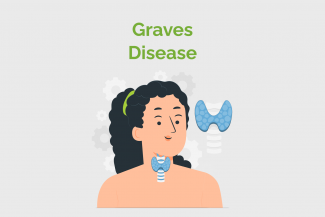
What is Graves' disease?
Graves' disease is an autoimmune disorder that causes the thyroid gland to become overactive. This is one kind of hyperthyroidism.
An autoimmune disorder causes the body’s immune system to mistakenly attack the body’s own cells instead of protecting them from outside invaders.
In Graves’ disease, the body’s immune system secretes immunoglobulins (autoantibodies) against the thyroid gland. These immunoglobulins irritate the thyroid gland and make it produce more thyroid hormone, which causes the symptoms related to Graves’ disease. This overactive thyroid state is hyperthyroidism.
Graves’ disease is also known as:
- Autoimmune hyperthyroidism
- Basedow disease
- Exophthalmic goiter
- Toxic diffuse goiter
Though both men and women can get Graves' disease, women are 10 times more likely to get it than men. It usually occurs in women in their 20s and 30s.
What is the thyroid gland?
The thyroid gland is a butterfly-shaped endocrine gland that is located in the lower front of the neck. The thyroid’s job is to make thyroid hormones, which are secreted into the blood and then carried to every tissue in the body. The thyroid hormone helps the body use energy, stay warm and keep the brain, heart, muscles, and other organs working as they should.















